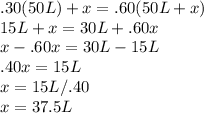Answer:
a) 6.
b) 24.25 (but this is not an integer, so there is no solution).
c) The difference is 2 and the smallest number is 42.
d) We should add 37.5 liters of water.
Explanation:
a) Ten less than four times a number is 14.
If the number is x, then four times the number would be 4x and ten less than it would be 4x-10.

The number is 6.
b) The small integer is x and the larger integer is x+3, if we multiply the smaller integer by 3, we get 3x. Now we will sum 3x to x+3 and the result should be 100.

This problem has no solution because x=24.25 but the problem says x is supposed to be an integer.
c) If we name the smaller number x, then the second one would be x+1 and the third one would be x+2.

The smaller number is 42 and the difference between the smallest and the largest is 2 (we didn't have to solve the equation to tell this, since they are 3 consecutive numbers, the first one is x and the last one is x+2, giving us a difference of 2)
d) Let's call x the number of liters of water we should add. Now we have that our current mixture has 50 liters of 70% ethyl alcohol, therefore it has 30% of water. Once we have added the x liters we will have 50 + x liters and we want this mixture to be 60% of water
 .
.
We should add 37.5 L of water.